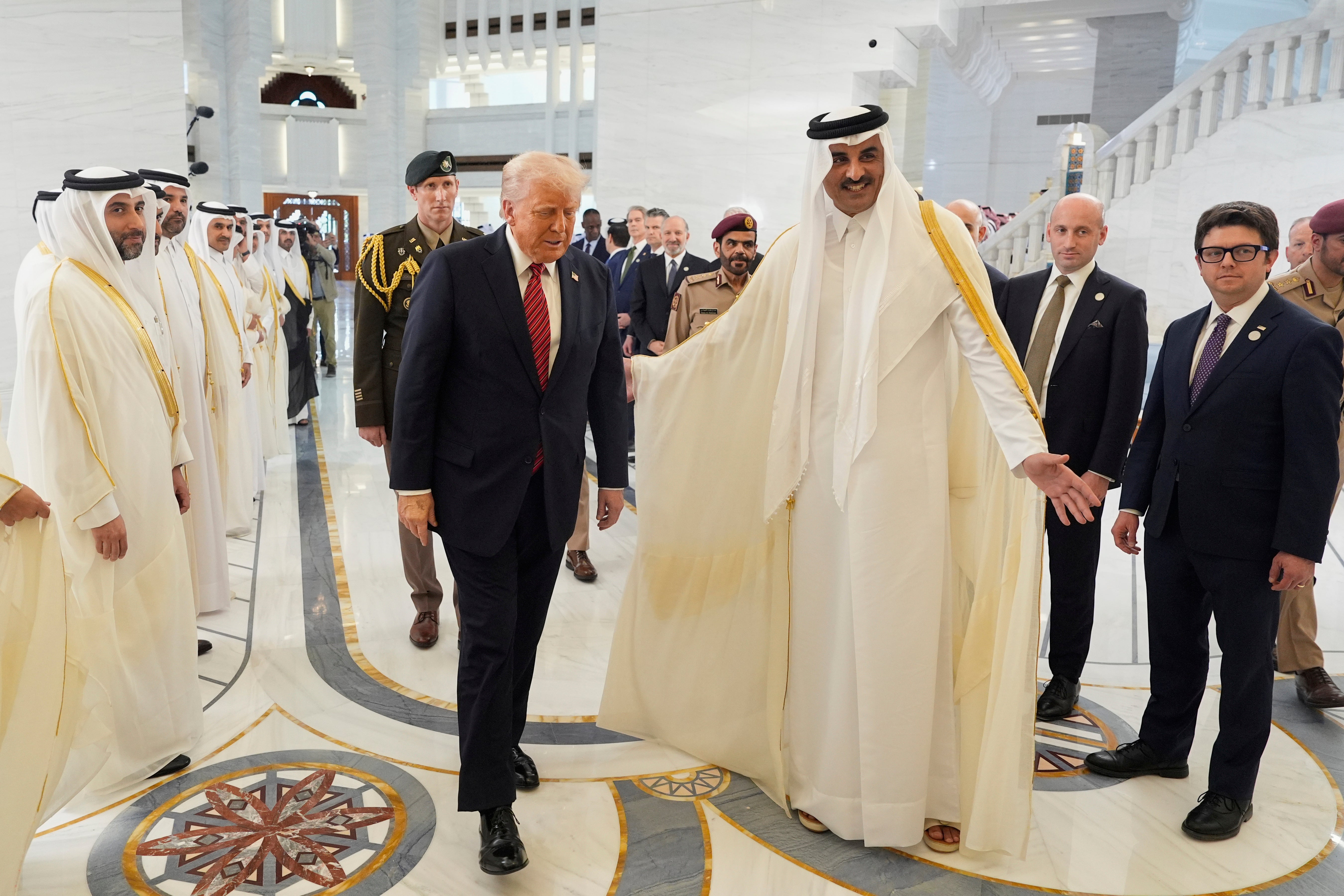Donald Trump praises ‘young, attractive’ ex-terrorist Syrian leader Ahmed al-Sharaa
President says former al-Qaeda terrorist is ‘pretty amazing’ after historic handshake
Donald Trump shook hands with Syria’s Islamist ruler on Wednesday – the first encounter between the two nations' leaders in 25 years and a potential turning point for Damascus as it struggles to emerge from decades of international isolation.
The US president warmly greeted former al-Qaeda fighter Ahmed al-Sharaa in a historic meeting unthinkable only a few months ago.
Under the nom de guerre Abu Mohammed al-Golani, Mr Sharaa rose through the ranks of al-Qaeda and fought US forces in Iraq before entering the Syrian war. He was even imprisoned by US troops for several years.
He became Syria’s interim president in January after insurgent groups led by his Hayat Tahrir al-Sham (HTS) stormed Damascus and deposed the Assad family after 54 years in power.
“He's got a real shot at holding it together,” said Mr Trump, who lifted all US sanctions on Syria – an announcement that led to celebrations in Damascus and other cities across Syria. He also encouraged Mr Sharaa to join Morocco and the UAE in normalising ties with Israel.
After the meeting, which took place in Saudi Arabia in the presence of Crown Prince Mohammed bin Salman, Mr Trump praised Mr Sharaa to reporters as a “young, attractive guy,” adding: “Tough guy. Strong past. Very strong past. Fighter. He's a real leader. He led a charge and he's pretty amazing.”
Mr Trump then flew to Qatar, where he oversaw the signing of deals including an order for 160 Boeing aircraft that he said was worth more than $200bn (£151bn).

The president’s four-day visit highlights the United States' growing ties to the oil-rich region, where his real-estate company is also developing several projects.
Mr Trump dismissed ethical concerns about his plan to accept a $400m luxury plane from Qatar to serve as Air Force One, saying it would be “stupid” to turn down the generous offer – a stance has drawn criticism even from Republicans.
Meanwhile, Mr Trump said Qatar's ruling emir, Sheikh Tamim bin Hamad al-Thani, reminded him of the Saudi crown prince. He called them both “tall, handsome guys that happen to be very smart.”
During his trip, he marvelled at the “perfecto” marble in Qatar and spoke of the “gleaming marvels” in Saudi Arabia.
The overthrow of Bashar al-Assad in December sparked celebrations across Syria, where the economy has been ravaged by 14 years of civil war and international isolation. But Mr Sharaa still faces daunting challenges to building the kind of peaceful, tolerant Syria he has promised.

His ties to al-Qaeda stretch back to 2003, when he joined the insurgency after the US-led invasion of Iraq. He helped al-Qaeda form an offshoot in Iraq that attacked both US forces and the country's Shia majority, often using car and truck bombs. He was detained by the US and held for over five years without being charged.
The group's Iraqi leader, Abu Bakr al-Baghdadi, sent Mr Sharaa to his native Syria in 2011 after a popular uprising led to a brutal crackdown and eventually a full-blown civil war. There, Mr Sharaa established an al-Qaeda branch known as the Nusra Front.
The two insurgent leaders had a brutal falling out when Mr Sharaa refused to join al-Baghdadi's Isis group and remained loyal to al-Qaeda's central leadership. The Nusra Front later battled the Isis group.
In his first interview in 2014, he kept his face covered and said Syria should be governed by Islamic law, an alarming prospect for the country's Christian, Alawite and Druze minorities. Mr Sharaa also said he couldn't trust Gulf and other Arab leaders who he said had sold themselves to Washington to stay in power.

But in the following years, he began rebranding himself and the armed group he led. In 2016, he announced that he had severed ties with al-Qaeda. He began appearing in public unmasked and in military garb and changed his group's name to HTS.
In power, he has vowed to rid the country of Iranian influence and Iran-backed armed groups such as the Lebanese militia Hezbollah. He promised an inclusive, representative government that would allow the country's many ethnic and religious groups to live in peace.
A constitutional declaration broadened his powers and said Islamic law would remain at the heart of legislation for a five-year interim period. Mr Sharaa argued that the measures were needed to stabilise the country, while many critics viewed it as a power grab.
Associated Press and Reuters contributed to this report

Join our commenting forum
Join thought-provoking conversations, follow other Independent readers and see their replies
Comments